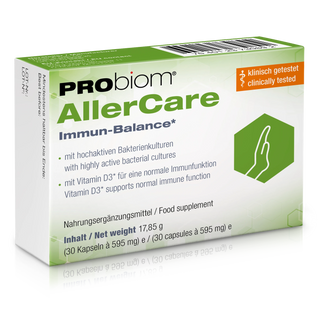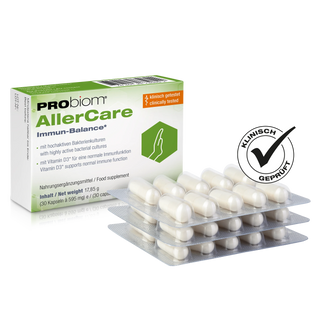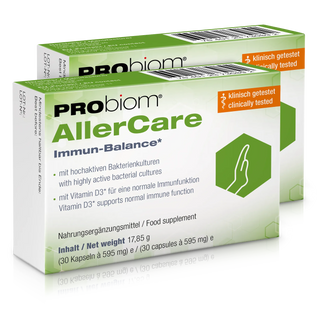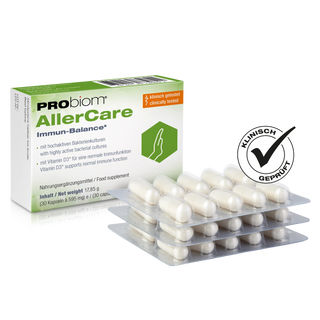Allergies are among the most common chronic diseases worldwide. Seasonal allergies, such as hay fever and year-round allergies to house dust mites or pet dander, often pose the question: Which time of day is the most severe? Symptoms don't seem to be equally severe at all times of day, but often fluctuate depending on environmental factors, pollen count, humidity, and other influences. In this article, you'll learn when allergy symptoms are most intense, which types of allergies are most bothersome at which time of day, and how you can specifically alleviate your allergy symptoms.
Why do allergy symptoms fluctuate throughout the day?
Allergic reactions are triggered by the immune system when it overreacts to otherwise harmless substances such as pollen, pet dander, or dust mites. The intensity of symptoms can vary significantly throughout the day. This depends on several factors:
-
Pollen season: Many plants release more pollen at certain times of the day, which is particularly stressful for allergy sufferers.
-
Temperature and humidity: They influence pollen levels and the behavior of house dust mites.
-
Air pollution: Pollutants in the air can irritate mucous membranes and worsen allergies, often during times of day with high traffic volumes.
-
Physical activity: Sports or exercise in the fresh air increase the absorption of allergens.
-
Sleep-wake rhythm and hormone balance: The human organism reacts differently depending on the time of day, which also affects allergic reactions.
Which time of day is most severe for allergies? An overview
1. Morning allergy symptoms – Why many allergy sufferers suffer particularly in the morning
Many allergy sufferers report that their symptoms are most severe in the morning after waking up. This particularly applies to hay fever and house dust mite allergies.
Causes:
-
Pollen levels are often high in the morning because many plants release pollen in the early hours.
-
House dust mite excrement accumulates in bedrooms overnight, which irritates the mucous membranes, especially in the morning.
-
The natural drying of mucous membranes overnight can worsen symptoms.
-
Nasal breathing is often reduced at night, leading to nasal congestion and pressure in the morning.
Symptoms:
-
Severe sneezing and runny nose immediately after waking up
-
Itchy, watery eyes
-
Tiredness and fatigue due to poor sleep caused by the allergy
2. Allergy in the morning and midday – When hay fever and pollen allergies are particularly active
Morning and midday are among the peak times for pollen counts. Especially for those with pollen allergies such as grass, birch, or mugwort pollen, pollen counts are often highest between 10 a.m. and 2 p.m.
Why?
-
The temperature rises, making it easier for pollen to get into the air.
-
Light wind spreads pollen more frequently.
-
People are often outside at this time, which increases allergen contact time.
Typical symptoms:
-
Severe sneezing attacks
-
Tingling and itching in the nose and eyes
-
Cough and dry cough due to mucous membrane irritation
3. Afternoon and evening allergies – When house dust mites and pet hair allergies increase
House dust mite allergies and pet hair allergies often occur in the afternoon and evening, especially if you spend a long time indoors.
Background:
-
House dust mites are particularly active in beds, upholstered furniture and carpets – places where people spend a lot of time in the evening.
-
As the day goes by, dust and mite droppings accumulate, which can worsen symptoms in the evening.
-
Pet hair and dander also settle in living spaces and cause allergic reactions if you come into contact with them for a long time.
Symptoms in the evening:
-
Blocked nose and pressure in the forehead
-
Coughing fits and shortness of breath, especially in allergic asthma
-
Itching and skin redness in contact allergies
4. Allergy at night – Why many allergy sufferers sleep poorly
Nighttime is a particularly stressful time for many allergy sufferers. Allergic symptoms can disrupt sleep and lead to daytime fatigue.
Causes:
-
When lying down, mucus drains more slowly, which puts additional strain on the respiratory tract.
-
House dust mite concentration is highest in bed.
-
The body's natural cortisol levels drop at night, which can increase inflammatory reactions.
-
The mucous membranes dry out, which worsens the irritation.
Consequences:
-
Nighttime coughing fits
-
Shortness of breath and difficulty breathing through the nose
-
Frequent waking and restless sleep
Which allergy is worst at which time of day? Allergy types compared
Hay fever and pollen allergy – peak in the morning and midday
Most pollen flies in high concentrations in the morning, which is why allergy sufferers with hay fever suffer most during this time of day. Grass pollen and birch pollen have typical flight times that shift seasonally.
House dust mite allergy – symptoms especially in the morning and evening
House dust mites live primarily in the home. Symptoms are often worst in the morning and evening, as people are more likely to come into contact with mite excrement in bed or on furniture.
Pet allergy – Most severe symptoms in the afternoon and evening
The symptoms are particularly noticeable after prolonged indoor exposure, where pet hair and dander accumulate. The symptoms are particularly severe in the evenings when you're at home.
Mold allergy – variable depending on humidity and ventilation
Mold spores are often found in humid indoor spaces. Their concentration can vary depending on ventilation and time of day, but they are often higher in the early morning or late evening.
Tips for relieving allergy symptoms depending on the time of day
Reduce morning allergy symptoms
-
Regularly clear out bedrooms thoroughly and wash bed linen at at least 60 degrees to reduce dust mites.
-
Only ventilate your bedroom briefly in the morning and, if possible, not during pollen season.
-
Use an air purifier with a HEPA filter to minimize pollen and mite particles.
-
Nasal rinsing with saline solution in the morning helps to remove pollen residue.
Effectively combat allergies in the morning and midday
-
Avoid outdoor activities during peak pollen season (usually 10 a.m. to 2 p.m.).
-
Wear sunglasses to protect your eyes from pollen.
-
Change clothes after being outside to avoid bringing pollen into the house.
-
If necessary, use antiallergic nasal sprays or eye drops after consulting your doctor.
Reduce evening allergy symptoms
-
Clean your home regularly and avoid carpets and upholstered furniture that harbor dust mites.
-
If possible, keep pets out of the bedroom.
-
Avoid smoking and strong fragrances, which can further irritate the mucous membranes.
-
If you are allergic to dust mites, use special mite-proof bed covers.
Sleep better at night despite allergies
-
Keep the room temperature cool and the humidity moderate (40–50 percent).
-
Use allergy-friendly bedding and wash it regularly.
-
Stick to a regular bedtime and maintain a relaxing evening routine to calm your immune system.
-
If necessary, consult your doctor about anti-allergic medications that improve sleep.
Conclusion: Which time of day allergy is the worst?
The answer to the question of which time of day is the worst allergy depends largely on the type of allergy in question. Hay fever sufferers often experience the most severe symptoms in the morning due to the intense pollen count. House dust mite allergy sufferers, on the other hand, experience particularly severe symptoms in the morning and evening, as they are primarily exposed to allergens indoors. Pet allergies often worsen in the afternoon and evening when contact with pets lasts longer. In addition, many allergy sufferers experience symptoms such as coughing or nasal congestion at night, which impairs sleep and quality of life.
It's important to closely monitor your allergy symptoms and develop an appropriate time-of-day strategy. Targeted measures such as room ventilation, pollen filters, allergy-friendly bedding, and, if necessary, medication can significantly reduce symptoms.















